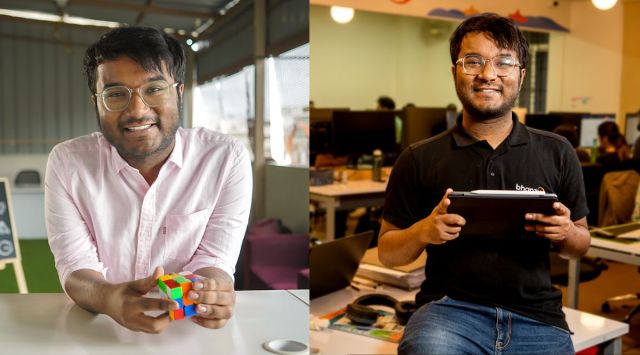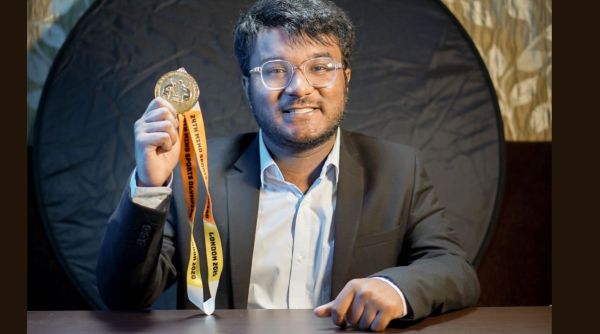‘World’s fastest human calculator’: Neelakanta Bhanu is not your regular math nerd
At just 23, Neelakanta Bhanu is working towards dispelling math phobia by changing the way the subject is taught.

When Neelakanta Bhanu got a skull fracture in a road accident that kept him from going to school for a year, he took up puzzle-solving and math games to pass the long hours. For a five-year-old, recovering from a serious head injury, there were serious apprehensions about how the accident would affect his mental abilities. Fortunately for Bhanu, he used this time to hone his cognitive skills.
Following his recovery, Bhanu started the saga of winning competitive math championships. By the age of 21, he had broken four world records, 50 Limca Book Records, and became the “Fastest Human Calculator in the World”. In 2020, he won gold at the Mental Calculation World Championship, a contest that is considered the Olympics of maths. This achievement made him the first non-European to win the championship in its 25-year history.
 In 2020, Bhanu became the first non-European to win gold at the Mental Calculation World Championship.
In 2020, Bhanu became the first non-European to win gold at the Mental Calculation World Championship.
When asked how come he is the only Indian to have won the championship, considering how Indians are often seen as math nerds, Bhanu attributes this to a mix of “lack of exposure” and the rigid way Math is taught in India.
As per the 2009 PISA test (which evaluates whether students can solve mathematical problems through scientific thinking) India was ranked 72nd out of 73 countries. Interestingly this was also the only time when India participated in the test.
Talking about this conundrum where Indian coders or techies have an overwhelming presence in places like Silicon Valley but the country still has low PISA rankings, Bhanu points outs that those who make it to the top positions at big brands are a 10% minority and it would be insincere to say that they represent the majority. But he is quick to add that this is not to discredit the mathematical prowess of Indians and mentions Shakuntala Devi, who made the world record for “fastest human computation” after she multiplied two 13-digit numbers within 28 seconds.
Bhanu’s understanding of India’s mathematics scene is not just informed by his close involvement with math contests but also by his work in public sector schools, which he chose over joining a lucrative MNC job or studying abroad.
After doing a BSc Honours degree in Mathematics from St. Stephen’s College, Bhanu decided to stay in India. Talking about his decision to stay, he says, “I knew for a fact that my journey in becoming the fastest human calculator has pedagogical implications. And the best place to implement them is India.”
His initiative Exploring Infinities, which he started in his second year of college, partnered with Telangana Government to improve math education in the state. However, soon Bhanu and his team realised the limitations of the public sector and decided to build Bhanzu, an EdTech dedicated to just maths.
Explaining the decision to move from the public sector to the private, Bhanu says with the practicality of a businessman, “Public sector is a place that you cannot consolidate and make it even bigger. You can obviously work with one state on one project but you can only stay as an initiative. You can’t be a company, which can revolutionise math education.” And the plan for revolution is simple: strip down the complexities of math to its basics and “understand why you need to learn mathematics in the first place”.
Talking about the “dehumanisation” of maths Bhanu says, “India is lagging in maths education because a 10th grader does not know what multiplication means. They know that 7 multiplied by 8 is 56, but they don’t know why.” He then adds, “We can have people who find math boring and that’s okay as long as they understand its use in their lives. It’s like not everyone who learns a language writes a book, right? But as long as everyone can read and converse among themselves, you’re good. It should be the same with math”.
The hyper fixation on speed prompts Bhanu to offer an interesting take on disciplines like abacus and Vedic math that teach one to solve equations quickly through “shortcuts” but do not necessarily make one understand the rationale behind an equation. According to Bhanu, this ends up creating “solvers” instead of “thinkers who can engineer their own methodologies”.
One can’t help but wonder about the limitations of his EdTech’s aim to eradicate global math phobia considering their subscription-based model that inherently becomes inaccessible to millions just by the virtue of its medium.
For this criticism, Bhanu has one simple response. He aims to first build a profitable startup that can ultimately support millions of children on the backs of its research and resource-rich capital. He argues that in a society that incentivises the private sector more than the public sector, playing by the rules of capitalism can offer better opportunities for reaching the masses. It will be interesting to see if Bhanu’s logic adds up, only the future can tell.




- 01
- 02
- 03
- 04
- 05



























